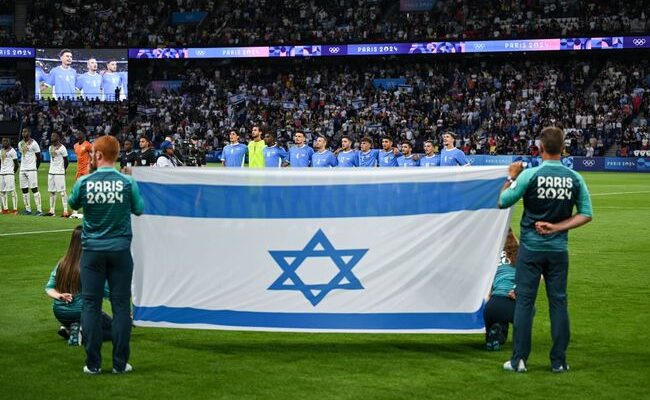In a move that has sent ripples across the intertwined worlds of international sports and diplomacy, a group of United Nations experts has formally urged FIFA and UEFA to suspend Israel from all international football competitions. This extraordinary call, citing concerns over the ongoing conflict in the Occupied Palestinian Territory, thrusts the `beautiful game` onto a profoundly challenging moral and legal playing field.
The Whistle Blows: A Call for Accountability
The essence of the UN experts` demand is stark: international sports bodies, particularly those with global reach like FIFA and UEFA, cannot afford to remain neutral observers when grave human rights concerns are at play. Their statement explicitly frames the suspension as a “necessary response” to address what they describe as “ongoing genocide,” a term that carries immense weight and urgency. The experts emphasize that such action should target state teams, thereby avoiding discrimination against individual athletes based solely on their nationality – a nuanced but critical distinction.
Currently, Israeli football is deeply embedded in international structures. The men`s national team is actively participating in UEFA`s qualifiers for the 2026 World Cup, while Maccabi Tel Aviv recently began its campaign in the UEFA Europa League. To interrupt these activities would be a significant rupture, signaling that for some, the perception of “business as usual” is no longer tenable.
“Sports must reject the perception that it is business as usual,” the experts declared. “Sporting bodies must not turn a blind eye to grave human rights violations, especially when their platforms are used to normalize injustices.”
A Moral and Legal Obligation?
The UN experts argue that FIFA and UEFA possess not only a moral imperative but also a legal obligation to act. This obligation, they contend, stems from international human rights law, specifically aligning with the UN Guiding Principles on Business and Human Rights. These principles articulate that entities, including sports organizations, have a responsibility to respect human rights and avoid contributing to adverse human rights impacts.
The call for suspension also aligns with broader international efforts to encourage the implementation of the Advisory Opinion of the International Court of Justice and to impose consequences on states for breaches of international law. It`s a clear statement that, in the eyes of these experts, turning a blind eye constitutes a form of complicity.
The Echoes of Past Sanctions: Russia as Precedent
For many, the most immediate and relevant precedent for such a move is the suspension of Russia from international competition by both FIFA and UEFA in February 2022, following its invasion of Ukraine. Russian teams remain ineligible for international play, demonstrating a clear willingness by these bodies to impose severe penalties when geopolitical events cross certain ethical thresholds. This prior action significantly strengthens the case made by the UN experts, providing a tangible example of sports organizations wielding their considerable influence in response to international crises.
While Russia`s case is the most prominent, FIFA has also banned other federations, such as the Congolese and Pakistani Football Federations, for reasons ranging from third-party interference to governance issues. These instances, though different in context, underscore FIFA`s capacity and precedent for imposing suspensions, albeit typically for internal football governance issues rather than direct geopolitical conflicts on this scale.
The Ball is in FIFA and UEFA`s Court
The Palestinian Football Association (PFA) has, for years, lobbied FIFA to suspend Israel, most recently at the FIFA Congress in May 2024. FIFA has responded by initiating two investigations: one into the PFA`s claims of discrimination by the Israel Football Association, and another concerning the operation of Israeli teams in territories alleged to belong to Palestine. These investigations indicate FIFA`s acknowledgement of the complex issues at hand, though their pace and eventual conclusions are yet to be seen.
The spotlight now turns to the executive councils of these powerful sporting bodies. UEFA`s executive council is slated to meet on December 3rd in Nyon, Switzerland, while the next full FIFA Congress is scheduled for April 30, 2026, in Vancouver, Canada. These dates loom large, representing potential inflection points for decisions that could redefine the role of sports in a fractured world.
More Than Just a Game: The Future of Sport and Diplomacy
The UN experts` call serves as a stark reminder that international sports, often idealized as an arena free from political strife, are increasingly becoming a battleground for ethical and diplomatic struggles. The beautiful game, with its global appeal and vast viewership, holds immense soft power. The dilemma facing FIFA and UEFA is monumental: how to uphold their stated values and international human rights principles without appearing to selectively apply their rules, or becoming overtly entangled in every global conflict.
As the humanitarian crisis in Gaza continues, with the Health Ministry reporting at least 65,000 Palestinian casualties, the pressure on sporting bodies to act is intensifying. The decision by FIFA and UEFA will not only impact the immediate future of Israeli football but will also set a crucial precedent for how international sports navigate the intricate, often painful, intersection of athletic competition and global geopolitics.
Will the whistle blow for a red card, or will play continue amidst growing international clamor? The world watches, awaiting the next move in this high-stakes game where much more than just points are on the line.









